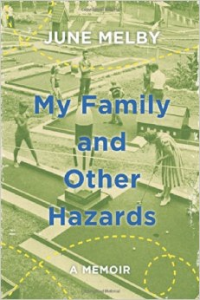
Henry Holt and Co.
320 pages, $25.00
Review by Denton Loving
When June Melby’s family decided to buy the Tom Thumb Miniature Golf course in Waupaca, Wisconsin, nobody understood the myriad ways such a game would affect and influence their family. Melby’s memoir, My Family and Other Hazards, details their relationship with the game of mini-golf, both as a business and as one of the constants in their lives. But Melby’s narrative isn’t merely childhood reminiscence, and although Melby reports about the interesting history of mini-golf, it’s so much more than an historical account.
Melby’s cleverness should be noted in many ways, most obviously with the book’s framework—eighteen chapters, one for every hole in the course. But the beginning of the course isn’t exactly the beginning of the story. The force behind this recounting of Tom Thumb’s history begins with a moment of crisis when Melby’s parents plan to sell the course.
Melby and her sisters spent every summer helping their parents run Tom Thumb. But by the time her parents decide to retire, Melby and her sisters have long been out of the nest. June has traveled the farthest in distance in order to pursue a career in stand-up comedy and acting in Los Angeles, but in spite of the miles, the loss of the family’s mini-golf course strikes June the hardest.
“I had planned to become a whopping success in entertainment,” June writes, “and then I’d sweep in and buy this place from Mom and Dad so they could retire. I never expected to, you know, fail.”
So the decision to sell the course becomes the catalyst for Melby to re-examine her life, which drives her back to Wisconsin to spend one last summer at Thom Thumb. One last summer vacuuming the greens, popping popcorn for tourists, watching and trying to understand her parents.
The relationship that develops between business owners and customers is a recurring theme in My Family and Other Hazards, especially when that family business holds tremendous meaning in the hearts of those customers and especially when those customers are tourists who return summer after summer so that a relationship inevitably develops. Melby writes:
“Tourists are like children. And like sick people in the hospital. Which is to say, they aren’t in charge, but the line is definitely blurry. There are limits to what you can say to a customer. You can offer bug spray. You can give them a hint on how to play #10. You can suggest they allow another group to go ahead if they are slow. But you can’t scold people for laughing too hard.”
What Melby’s really suggesting here is that there are walls between people understanding each other. For Melby, there are no greater walls then those between her and her parents: “I don’t remember one specific time I questioned my parents, because I’m not sure there was a time when I didn’t.”
And here lies the hot center of My Family and Other Hazards, a hot center that is unique and fascinating because of Melby’s particular circumstances but so common in relationships between parents and children. We often want the very ideas we spend our lives running away from.
For June Melby, this realization might have taken a lot longer to understand if it hadn’t been for the confluence of her parents’ impending retirement and her growing disillusionment of Los Angeles. Specifically, her eyes are opened by this last summer at Tom Thumb, where she sees tourists and customers come back one last time, so many of them thanking her parents for their years of service to the community, thanking them for creating and sustaining memories.
At a moment of deepest understanding, Melby writes, “What kind of American dream is this? If you live your life in a generous way, ignoring the pressure to be selfish, will you actually come out ahead?”
Don’t we all hope this is true?
It seems to be for June Melby. As a comedian and actress, she had lost the reason to be in Los Angeles, but she found a greater, more satisfying success in sharing her family’s story with the world. She still takes to the stage, although she’s better known for her performance poetry than her stand-up these days. Thankfully, it’s clear from My Family and Other Hazards that she still has her sense of humor.
***
Denton Loving is the author of the poetry collection, Crimes Against Birds (Main Street Rag, 2015), and editor of Seeking Its Own Level, an anthology of writings about water (MotesBooks, 2014). He serves as editor of drafthorse literary journal. Follow him on twitter @DentonLoving.
![[PANK]](https://pankmagazine.com/wp-content/themes/pank/assets/images/pank-logo-large.png)
